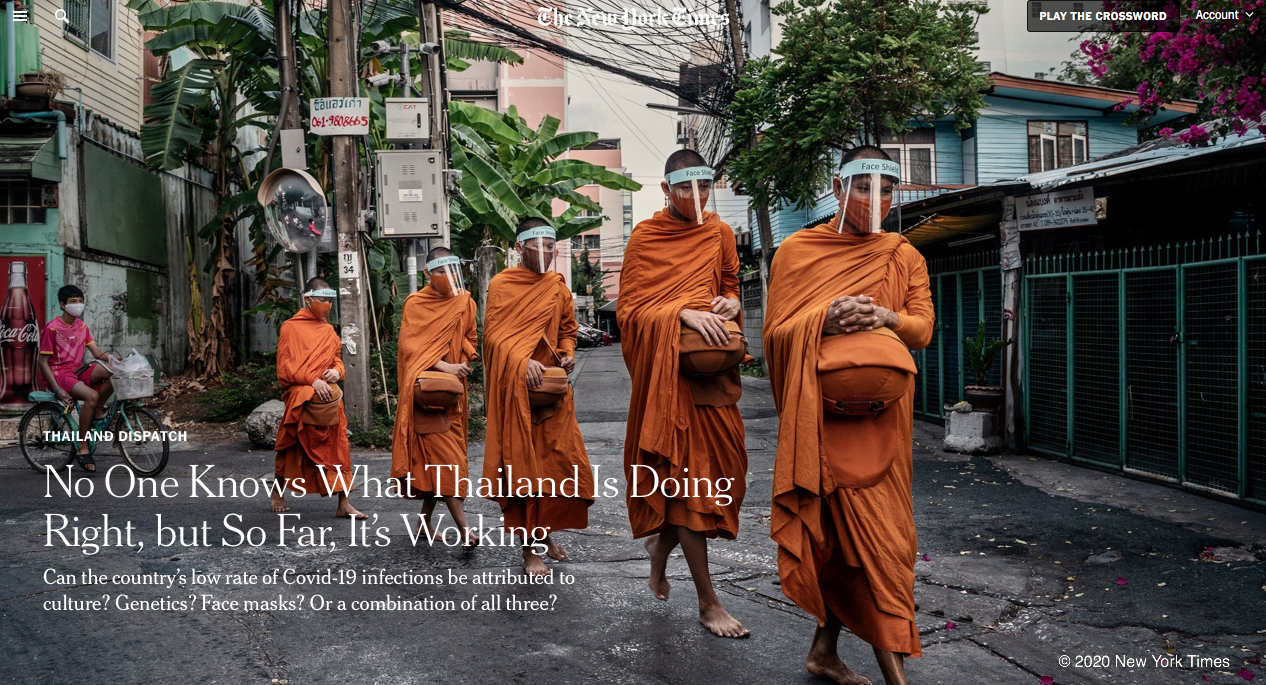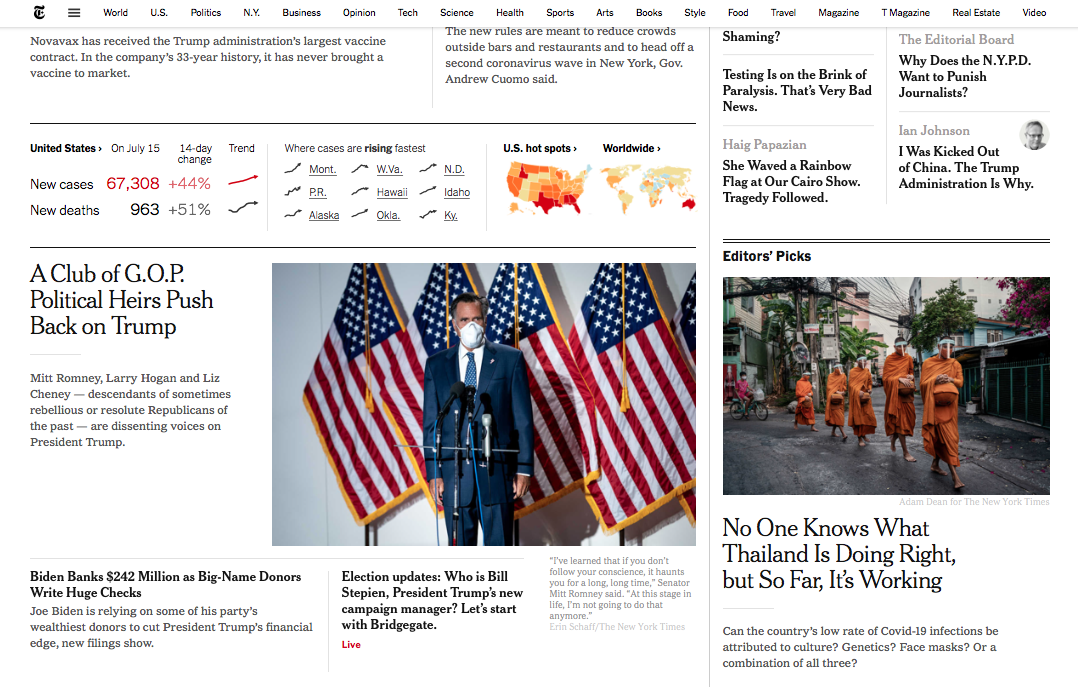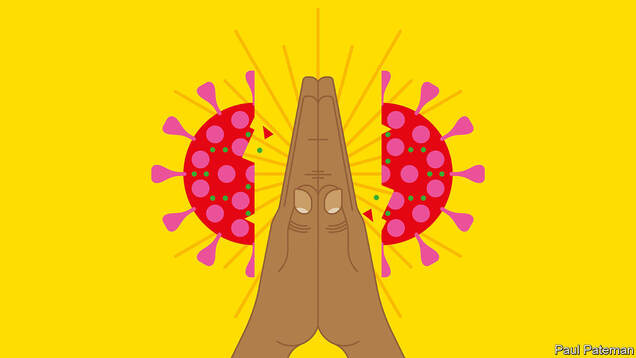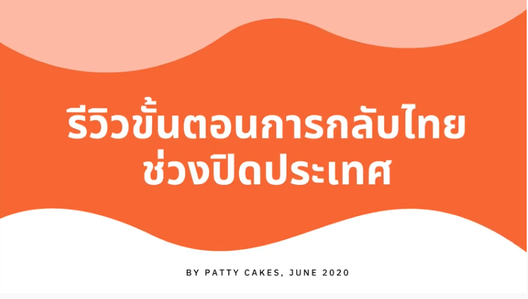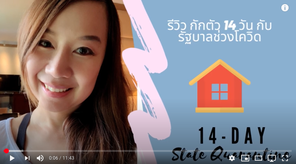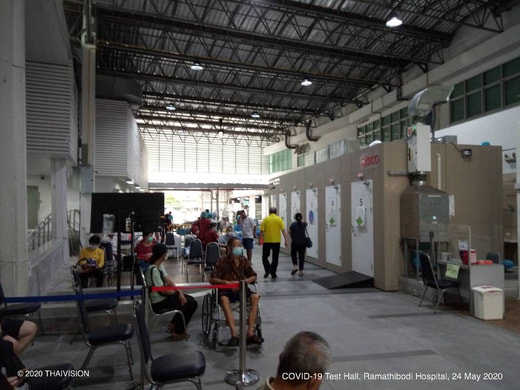ไม่รู้ว่าประเทศไทยทำอะไรได้ถูกต้องบ้าง แต่เท่าที่เห็นก็ใช้ได้เลย
|
No One Knows What Thailand Is Doing Right,
but So Far, It's Working By Hannah Beech Photographs by Adam Dean July 16, 2020Updated 12:55 p.m. ET BANGKOK "No one knows exactly why Thailand has been spared.
One thing is certain. Despite an influx of foreign visitors early in the year from countries badly hit by the coronavirus, Thailand has recorded fewer than 3,240 cases and 58 deaths. As of Thursday, there had been no cases of local transmission for about seven weeks."....... ▶️ THE NEW YORK TIMES + 18 PICTURES |
ไม่รู้ว่าประเทศไทยทำอะไรได้ถูกต้องบ้าง
แต่เท่าที่เห็นก็ใช้ได้เลย By Hannah Beech Photographs by Adam Dean July 16, 2020Updated 12:55 p.m. ET BANGKOK "ไม่รู้ว่าด้วยเหตุผลอันใดประเทศไทยจึงรอดพ้นภัยCOVID-19 ไปได้.
▶️ อ่านต้นฉบับเต็ม+18 ภาพ ที่ THE NEW YORK TIMES |
กองบรรณาธิการ New York Times (16 July 2020)
ยกเรื่องประเทศไทยจัดการปัญหา COVID-19 ได้สำเร็จเป็นอย่างดี ขึ้นหน้า 1 เป็นเรื่องที่เห็นว่าต้องแนะนำให้คนอเมริกันอ่านกัน
และเช้าวันนี้ (17 July 2020 ) CNN ก็เสนอข่าวยกตัวอย่างประเทศไทย, New Zealand, และประเทศอื่นที่ประสพความสำเร็จ
ในการจัดการปัญหา COVID-19 ด้วย
▶️ FOLLOW THE NEW YORK TIMES FULL STORY + 18 PICTURES
ยกเรื่องประเทศไทยจัดการปัญหา COVID-19 ได้สำเร็จเป็นอย่างดี ขึ้นหน้า 1 เป็นเรื่องที่เห็นว่าต้องแนะนำให้คนอเมริกันอ่านกัน
และเช้าวันนี้ (17 July 2020 ) CNN ก็เสนอข่าวยกตัวอย่างประเทศไทย, New Zealand, และประเทศอื่นที่ประสพความสำเร็จ
ในการจัดการปัญหา COVID-19 ด้วย
▶️ FOLLOW THE NEW YORK TIMES FULL STORY + 18 PICTURES
|
Vertical Divider
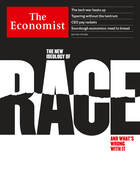
Asia Edition / 11 July 2020Banyan
Why has the pandemic spared the Buddhist parts of South-East Asia? Cambodia, Laos, Myanmar, Thailand and Vietnam have had only tiny outbreaks Asia Jul 11th 2020 edition Editor’s note: Some of our covid-19 coverage is free for readers of The Economist Today, our daily newsletter. For more stories and our pandemic tracker, see our hub One of the bigger riddles of the global pandemic lies in South-East Asia. Despite being close to the source of covid-19, in China, and to one of the current hotspots of the outbreak, India, the partly or largely Buddhist countries of Cambodia, Laos, Myanmar, Thailand and Vietnam have scarcely sneezed. Vietnam is the standout: with 97m people, it claims no deaths from covid-19. Thailand, with 70m, has seen just 58 fatalities and no local transmission in over 40 days. Impoverished Myanmar claims just six deaths from 317 cases, while Cambodia (141 confirmed cases) and tiny Laos (19 cases) also have no deaths apiece and no local transmission since April. Compare that with the nearby archipelagic nations of Indonesia (some 68,100 cases and 3,400 deaths) and the Philippines (50,400 cases and 1,300 deaths), where the pandemic still rages. Set aside karmic grace as an explanation, especially given that Vietnam’s communist dictatorship is atheist. Vietnam’s success, indeed, is easiest to explain. The country has a suspicion of its big northern neighbour, China, rooted in millennia of historical interaction. At the start of the year it instinctively distrusted China’s reassurances about the disease and even launched cyber-attacks to get better information on the epidemic’s course. It closed its border and used authoritarian powers to lock down the population and trace and isolate cases. That, in essence, is what China’s communist authorities were also doing. Few governments have both the overweening power and effective health systems needed to emulate China and Vietnam, but Thailand, a sham democracy overseen by generals, perhaps comes closest. The quality of its health care makes Thailand a popular destination for medical tourism. Moreover, the government was quick to set up a vigorous covid-fighting task-force. Thailand’s success comes despite close ties with China. Plenty of people-to-people exchanges might have been expected to spread infection. But that has not happened in Laos, which is too small to resist China’s blandishments, Myanmar, which is awash with Chinese traders and smugglers, or Cambodia, whose strongman, Hun Sen, is the region’s biggest cheerleader for China. Chinese construction is reshaping these countries, which all came under pressure not to close borders with China even as the pandemic spread. Mr Hun Sen pointedly travelled to Beijing in February, at the height of the Chinese epidemic. Thailand was welcoming Chinese visitors well into March. Myanmar’s border with China is extremely porous. Why did visitors from China not seed more South-East Asian outbreaks? One widespread suspicion is that they did, but these were not reported. Testing is severely limited in Cambodia, Laos and Myanmar. Yet, says Frank Smithuis of Medical Action Myanmar, a charity with several clinics around the country, if there had been large-scale transmission, his organisation would have noticed. It is not possible, he says, to hide a covid-19 outbreak—especially in Myanmar, the world’s “gossip country number one”. Experts in Cambodia, Thailand and Vietnam see no evidence of widespread transmission, such as people showing up at hospitals. Even the poorest countries adopted measures that must have helped check the spread of the coronavirus. Thitinan Pongsudhirak of Chulalongkorn University in Bangkok reports that migrant workers returning from Thailand to their villages in Myanmar often had to quarantine for 14 days in a shack outside their village. Other factors that may have helped, say health experts, include high numbers of people living in the countryside rather than in crowded cities; people more likely to live with fans and open windows than air-conditioning; the relative youth of the region; and a pre-existing proclivity for masks. There may be a religious element, too. The wai, a Buddhist greeting of palms pressed together, helps with social distancing. The question now is whether South-East Asia’s Buddhist successes can weather second or third waves. Perhaps, Mr Thitinan suggests, low transmission from China was not the miracle some divine—the giant neighbour, after all, quickly got on top of its epidemic. Now, transmission routes are changing. Across Asia, infections are being imported from all round the world, seeding local transmission, most recently in Hong Kong. The crowds this week in South-East Asian temples celebrating the start of Buddhist lent are a reminder of how easy it is to let covid guards fall. This article appeared in the Asia section of the print edition under the headline “Wai-five" READ FULL ARTICLE ▶️ THE ECONOMIST ▶️ THAILAND ▶️ IN MY OPINION A NOTE FROM THIS SUBSCRIBER
The Economist (11 July 2020), attempted to figure out the reason why Thailand, Cambodia, Laos, Myanmar, and Vietnam had surprisingly succeeded in fighting off the COVID-19 pandemic. The number of infected cases and fatality rates have been extraordinarily low in these countries. It could have been because of degrees of authoritarianism in their systems of government which may have effectively helped push the population in the direction desired to contain the virus. Or it could have also been the Buddhist way of life which helps contribute to a healthier lifestyle, together with more open-space living in rural communities. Only small number of people in Thailand live in flats or apartments where they would be cooped up between four walls. The Economist, however, did not have much to say about the Buddhist factor other than giving it an enticing headline and a mentioning of a Thai word 'Wai', a Thai (as well as Hindu) greeting with two enclosed palms, thus avoiding the western-style physical handshake. (It could not be called ‘Wai-five’ as suggested by The Economist since it uses two hands - ten fingers. A ‘Wai-ten’ will not be fashionable either. Just a plain ‘Wai’ would be fine.) The focus is more on various governments' effective measures and the population's willingness to comply with government directives. Their proximities to China, in terms of physical borders and flow of tourists, somehow keep the countries well informed and better prepared. As for Thailand, in spite of a 'sham democracy overseen by generals', The Economist attributes Thailand's success to 'the quality of its health care' that 'makes Thailand a popular destination for medical tourism', and that the Thai 'government was quick to set up a vigorous covid-fighting task-force'. It's nice to hear good news about Thailand from The Economist once in a while. I'm sure those generals will be happy to allow the circulation of this current issue of The Economist in their 'sham democracy'. By the way, The Economist Intelligence Unit categorizes Thailand in 2019 as a 'flawed democracy'. Now in 2020 it probably is downgraded to a 'flawed democracy in shamble'. It's OK with me, as long as I get my weekly printed copy of The Economist on time! Somkiat Onwimon Pak Chong 12 July 2020 |
Vertical Divider
A VISIT TO A HOSPITAL IN BANGKOK
IN THE ERA OF COVID-19 I am 72, a regular visitor at Ramathibodi Hospital in Bangkok. As a two-year bladder cancer survivor with a few other health issues common to an elderly person I find my hospital visit a norm of life. That is until the arrival of the Novel Corona Virus Diseases in 2019. I have happily retired from a long, exciting, active, and fulfilling public life as a political scientist, television journalist, documentary producer, a drafter of the 1997 constitution, and a one-term senator. During the two years following my bladder cancer operation in 2018 I am required to undergo update check-ups every 3 to 4 months. These involve blood and urine tests, ultrasound, x-ray, and cystoscopy. I also have prostatitis which requires regular administration of a drug called Uroflo. My hernia inflammation now needs an operation. Not to be outdone, in 2015 I met with a deadly car accident where I came out with all kinds of broken bones and one full year of convalescence. All these medical issues combined make my visit to the hospital in the era of COVID-19 all the more challenging. Ramathibodi Hospital of Mahidol University is among Thailand's most advanced and well-equipped hospitals. It is a public hospital which means it costs less than private hospitals but the healthcare facilities are of high quality as required by the world standard of medical science. Yes, it's a bit crowded because of its quality and relatively low cost. In fact, most hospitals in Thailand are of world standard because of adequate funding and doctors with world-class education and training. Medical science education is heavily subsidised by government funding and scholarships within the countries and abroad. Young Thai best medical minds can go to Harvard, Johns Hopkins, and Oxford, with full government scholarships. Freshly graduated Doctors are required to practice in the rural area for a couple of years before moving on into public hospital of their choices or enter private practice. Doctors in public hospitals are allowed to hold parallel jobs with private hospitals where they enjoy additional and higher pays. Provincial hospitals may be smaller and limited in equipments and resources but the expertise of doctors, nurses, and healthcare workers are of the same high standard as in any big-city hospitals. As for cancer treatment, Ramathibodi Hospital (or 'Rama' in short) is my hospital of choice. I told my doctor that I prepare myself exhaustively by reading many American and British books and websites on cancer and follow advices I have read from Johns Hopkins' Sidney Kimmel Comprehensive Cancer Center , American Cancer Society, The National Cancer Institute, And Bladder Cancer Advocacy Network (BCAN). My Thai doctor replied: "Don't worry, we at Rama are up to date with the world of medical science. Whatever is available and being practiced in the US we have it here at Rama." Thai doctors go by the books of science and I know I am in good hands at Rama at a fraction of the cost in the US. During this chaotic COVID-19 era Thailand has been very successful in coping with the pandemic. Temperature checking, infected person-tracing by mobile phone application, and hygienic measures are everywhere with full cooperation from the citizens, both in Bangkok and the provinces. The minute I enter the hospital door the fever temperature machine with a line of smiling nurses await me. I only have to look up at the distance camera on the machine to have my temperature read and then given an OK sticker on my shirt sleeve. People sitting or walking around the hallways and at fronts of the doctor rooms are advised to keep a social (or physical) distance the best way possible. But on a busy day a two-three-meter physical distance is a real challenge. And I always move to the best further-away seating possible. Everyone wears facial mask as a norm even long before the COVID-19 pandemic. Facial masks became a new normal since the particulate matter 'PM 2.5' air pollution had made big scary news in many big cities a year before the Novel Corona Virus Diseases of 2019. Thanks to efficient management of the Ministry of Public Health, anyone can get a COVID-19 test if needed. I never had a COVID-19 symptom so I don't need a test. I only come to the hospital on regular appointments and get to observe and absorb the atmosphere in the hospital every few months. Now that I have scheduled for a hernia operation on this coming Monday 25th May the doctor will give me free bonus of COVID-19 test the day before the operation. This is the normal practice of the hospital to administer COVID-19 test to pre-operation patients regardless of the symptom. So I got my very first COVID-19 test on Sunday morning of May 24th and the result came in the afternoon the same day. The testing was done in a tightly-closed room with glass window partition separating doctor and patient. The doctor put out her hands through two rubber holes in the window and instructed me to assist her (as earlier seen on the video in the waiting room). I was required to help the doctor going through the whole 5 minutes process - putting on PPE gloves for her, handing her the swab, letting her insert the flexible swab into my nostril, put the swab back into the tube container, closing the swab tube and put it into a zip-locked plastic bag. After thanking the doctor I came out of the test room and handed the test-kit to the nurse for immediate lab analysis. Rama Hospital informed me by phone in the afternoon that I tested negative. My son lives in Los Angeles. He suspected a COVID-19 symptom of loosing sense of taste and smell but he could not get a COVID-19 test anywhere for the past two months. He just quarantines himself in his apartment, alone with all his music-composition equipments to keep him from going crazy. He is a film music composer temporary devoid of work opportunity in the era of COVID-19 in 2020. A Magna Cum Laude graduate of Berklee College of Music, but being an Asian immigrant in the US during Donald Trump's era is worse than contracting COVID-19 or any disease, I sense. It seems like the American COVID-19 is racist and should be renamed "COVID-F" (Corona Virus Immigration Diseases-Forever - "F-Virus" for short). Medical science and public healthcare in Thailand are trusted and admired by developing countries around the world. Political leaders, king and queen, and ordinary citizens from neighbouring countries routinely come for medical treatment in Thailand. Migrant workers also are given the same healthcare privilege as any Thai citizen. The late King Bhumibol of Thailand, himself was born at Mount Auburn Hospital in Massachusetts, preferred medical service from Siriraj Hospital to any other hospital abroad till his final days. Medical tourism ranks Thailand among the world's top destinations. I am lucky to live in Thailand with world-class healthcare, especially in time of public health crisis. As of 9 December 2020 Thailand recorded a total of 4,151 COVID-19 cases, 25 more from the previous day. 3,880 cases were remedied, 211 still hospitalised, and 60 sadly died. With some minor precautions,Thailand is ready to open the country and live with the new normal disciplinary precaution starting Monday 15 June 2020. Only travellers from abroad will be routinely tested, given hotel rooms to stay in quarantine for 14 days with full bedding and lodging services, tested, treated, and traced after leaving the state quarantines.. As reported by the BBC and EuroNews, the European Union has agreed to lift travel restriction on the following 15 countries beginning 1 July: Algeria, Australia, Canada, Georgia, Japan, Montenegro, Morocco, New Zealand, Rwanda, Serbia, South Korea, Thailand, Tunisia and Uruguay. China is also allowed pending reciprocal agreement. The UK and four other non-EU states - Switzerland, Iceland, Liechtenstein and Norway - are automatically included as "safe". The race for COVID-19 vaccines is on in full force around the world and in Thailand. Leading universities, research institutes, scientists, a private biotech company in Thailand including Chulalongkorn University, Mahidol University, National Research Council of Thailand, National Vaccine Institute, and BioNet-Asia, in close cooperation with the University of Pennsylvania, my alma mater, have been hard at work together to find and then produce the best COVID-19 vaccine possible, probably within the next one to two years. With safety and efficacy as the ultimate goal, COVID-19 vaccine from Thailand and other countries will surely help save millions of lives and stop this deadly pandemic. Somkiat Onwimon 1 November 2020 |
|
Vertical Divider
|
Vertical Divider
|


